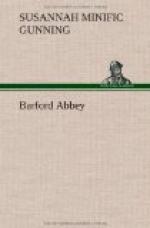Pardon me, dear Lady Powis—I am distress’d,—I am perplex’d; but I do not think ill of you;—indeed I cannot,—unless I find—No, I cannot find it neither;—something tells me Lady Mary, my dear honour’d Lady Mary, will acquit you.
We were receiv’d by Mrs. Jenkings, at our return, with a chearful countenance, and conducted to the dining-parlour, where, during our comfortable, meal, nothing was talk’d of but Sir James and Lady Powis:—the kind notice taken of your Fanny mentioned with transport.
Thus honour’d,—thus belov’d,—dare I repine?—Why look on past enjoyments with such a wistful eye!—Mrs. Whitmore, my dear maternal Mrs. Whitmore, cannot be recall’d!—Strange perversenss!—why let that which would give me pleasure fleet away!—why pursue that which I cannot overtake!—No gratitude to heaven!—Gratitude to you, my dearest Lady, shall conquer this perverseness;—even now my heart overflows like a swoln river.
Good night, good night, dear Madam; I am going to repose on the very bed where, for many years, rested the most deserving of men!—The housekeeper has been relating many of his virtues;—so many, that I long to see him, though only in a dream.
Was it not before Mr. Powis went abroad, that your ladyship visited at the Abbey?—Yet, if so, I think I should have heard you mention him.—Merit like his could never pass unnotic’d in a breast so similar—Here I drop my pen, lest I grow impertinent.—Once again, good night,—my more than parent:—to-morrow, at an early hour, I will begin the recital to your Ladyship of this day’s transactions—I go to implore every blessing on your head, the only return that can be offer’d by
F. WARLEY.
LETTER III.
Miss WARLEY to Lady MARY SUTTON, in continuation.
Barford Abbey.
I think I have told your Ladyship, I was to be honour’d with the coach to convey me to the Abbey.—About half an hour after one it arriv’d, when a card was deliver’d me from Lady Powis, to desire my friends would not be uneasy, if I did not return early in the evening, as she hop’d for an agreeable party at whist, Lord Darcey being at the Abbey.
Mrs. Jenkings informed me, his Lordship was a ward of Sir James’s just of age;—his estate genteel, not large;—his education liberal,—his person fine,—his temper remarkably good.—Sir James, said she, is for ever preaching lessons to him, that he must marry prudently;—which is, that he must never marry without an immense fortune.—Ah! Miss Warley, this same love of money has serv’d to make poor Lady Powis very unhappy. Sir James’s greatest fault is covetousness;—but who is without fault?—Lord Darcey was a lovely youth, continued she, when he went abroad; I long to see if he is alter’d by travelling.—Edmund and his Lordship were school-fellows:—how my son will be overjoy’d to hear he is at the Abbey!—I detain you, Miss Warley, or could talk for ever of Lord Darcey! Do go, my dear, the family will expect you.—Promise, said I, taking her hand,—promise you will not sit up late on my account.—She answer’d nothing, but pressing me to her bosom, seem’d to tell me her heart was full of affection.




